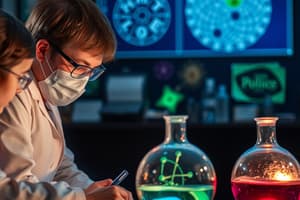Podcast
Questions and Answers
What is the purpose of designing experiments following the scientific method?
What is the purpose of designing experiments following the scientific method?
- To confuse the scientists conducting the experiments
- To make the experiments more challenging
- To ensure accurate and reliable results (correct)
- To limit the scope of the hypotheses
What happens if the results of an experiment contradict the initial hypothesis?
What happens if the results of an experiment contradict the initial hypothesis?
- The scientists stop refining their questions and hypotheses
- The hypothesis is immediately accepted as true
- New insights can still be gained from the data collected (correct)
- The experiment is considered a failure
How does science contribute to technological advancements?
How does science contribute to technological advancements?
- By limiting progress in various fields
- By restricting advancements in medicine
- By driving innovation and progress (correct)
- By discouraging communication between scientists
What is one of the key contributions of medical researchers?
What is one of the key contributions of medical researchers?
What is the role of ecologists in relation to the environment?
What is the role of ecologists in relation to the environment?
How does space exploration contribute to our understanding of the universe?
How does space exploration contribute to our understanding of the universe?
What is the core objective of science?
What is the core objective of science?
Which ancient Greek thinkers are mentioned as having roots in the scientific method?
Which ancient Greek thinkers are mentioned as having roots in the scientific method?
What is a hypothesis in science?
What is a hypothesis in science?
Which step in the research process comes after formulating hypotheses?
Which step in the research process comes after formulating hypotheses?
Who is known for their groundbreaking discoveries and advancements in science?
Who is known for their groundbreaking discoveries and advancements in science?
What distinguishes science from other approaches to understanding the world?
What distinguishes science from other approaches to understanding the world?
Flashcards are hidden until you start studying
Study Notes
Introduction to Science
Science is a systematic approach to understanding the world around us through observation and experimentation. It encompasses various fields of study such as biology, chemistry, physics, astronomy, geology, and many more. At its core, science seeks to collect evidence, construct explanations based on that evidence, and test those explanations by making predictions that can be tested through further experiments.
Origins of Scientific Method
The scientific method has its roots in ancient Greek philosophy, where thinkers like Aristotle and Socrates sought to understand the natural world through reasoning and observation. This tradition continued throughout history, with scientists like Galileo, Isaac Newton, Charles Darwin, Albert Einstein, Stephen Hawking, Marie Curie, and countless others making groundbreaking discoveries and advancing our knowledge of the universe.
Research Process in Science
The process of doing science involves several steps:
-
Observing: Scientists observe phenomena in the natural world, often using specialized equipment designed to measure specific properties or characteristics.
-
Questioning: From their observations, they develop questions about what they see, asking why things happen as they do.
-
Hypothesizing: They formulate possible answers to these questions in the form of hypotheses, which are tentative explanations that can be tested through experimentation.
-
Testing: To verify the accuracy of their hypotheses, scientists design experiments that will either support or disprove them. These experiments must follow strict guidelines, known as the scientific method, to ensure valid results.
-
Drawing Conclusions: If the results of the experiment support the hypothesis, it may be accepted as true. However, even if the results contradict the initial hypothesis, new insights can still be gained from the data collected during the experiment. In this case, scientists begin the cycle again, refining their questions, hypotheses, and methods until they arrive at accurate and reliable conclusions about the phenomenon under investigation.
Importance of Science in Our Lives
Science plays a crucial role in improving our lives and understanding the world better. Some of the ways it contributes are:
-
Technological advancements: Science drives innovation and technological progress, leading to improvements in communication, transportation, medicine, agriculture, and numerous other aspects of daily life.
-
Medicine: By studying human health and disease processes, medical researchers have developed treatments and cures for diseases, improved public health practices, and extended lifespans.
-
Environment: Ecologists work to protect and preserve natural resources while ensuring sustainable development.
-
Space exploration: Astronomers study celestial bodies and the universe itself, driving space exploration efforts that contribute to our understanding of the cosmos.
In conclusion, science is a vital tool for navigating our complex world. Through its careful application of the scientific method, scientists aim to uncover truths about the universe and improve our lives here on Earth. As we continue to ask important questions and explore the mysteries of nature, science will undoubtedly play a significant role in shaping our future.
Studying That Suits You
Use AI to generate personalized quizzes and flashcards to suit your learning preferences.




